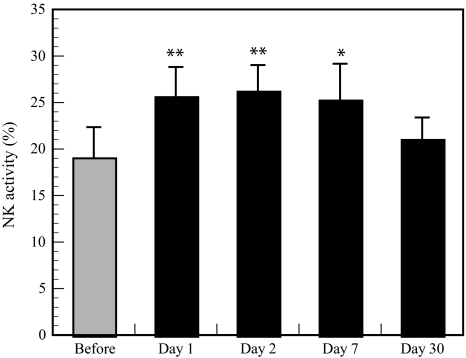
Forests have healing powers. This belief has its roots in Japan, where the practice of forest bathing, or Shinrin-yoku, evolved. Shinrin-yoku literally means bathing in the atmosphere of the forest, experiencing it through all of our senses. And there are health benefits that only the forest can impart.
The concept of forest bathing was born in Japan as part of a government initiative to improve the wellbeing of stressed-out workers. This makes sense when you consider images such as the Tokyo subway, filled with throngs of people being packed like sardines. But Japan is also very green—fully two-thirds of the country is covered by forests, some 97,000 square miles in all. Its major religions—Shinto and Buddhism—are rooted in nature.
The “birth” of forest bathing
The Japanese began to practice forest bathing based simply on the commonsense notion that spending time in the country’s beautiful forests would be good for them. In 1982 the then Director of the Agency of Agriculture, Forestry, and Fisheries of Japan declared that the people of Japan needed healing through nature, to overcome a “nature deficit disorder” brought about by urban life. (It also served their goal to protect the country’s forests from over harvesting.) And the term shinrin-yoku – forest bathing– was born.
We’re not surprised to learn that “leisurely walks on gentle paths under forest canopy” –without our phones, even our dogs–can be good for your health. Calmly listening to the rustle of leaves in the breeze, observing the different colors and patterns of the trees, and breathing deeply can lead to lower blood pressure, reduced stress, improved mood, increased energy, and better sleep. And over the past 40 years, plenty of data has been collected that shows this correlation.
Forest bathing may have continued gently onto the register of outdoor activities.
But in 2018, Dr. Qing Li, a researcher at Nippon Medical School in Tokyo and Chairman of the Japanese Society for Forest Medicine, published a book: “Forest Bathing: How Trees Can Help You Find Health and Happiness.” Forest bathing as a health modality suddenly became a media sensation.
Research determines forest bathing boosts the immune function
Beginning in 2005, Dr. Li began to study the effect of forest bathing on the human immune function. In particular he looked for any changes in the body’s natural killer (NK) cells, lymphocytes in the same family as T and B cells. NK cells are best known for killing virally infected cells and detecting and controlling early signs of cancer. They provide rapid responses to virus-infections, acting within three days after infection, and respond to tumor formation.
Phytoncides are the key
Li suspected these benefits could be achieved by breathing in volatile substances, called phytoncides (wood essential oils), which are antimicrobial volatile organic compounds derived from trees, particularly pines, cedars, spruces, and conifers.
While we breathe in the fresh air, we breathe in phytoncides, airborne chemicals that plants give off to protect themselves from insects. Phytoncides have antibacterial and antifungal qualities which help plants fight disease. When people breathe in these chemicals, our bodies respond by increasing the number and activity of a type of white blood cell called natural killer cells.
Dr. Li He recruited adult Japanese individuals, both male and female, to participate in controlled three-day/two-night trips to forest areas. To detect NK activity their blood and urine were sampled on the second and third days of each trip, and on days 7 and 30 after the trips.
The mean values of NK activity on forest bathing days were significantly higher than those on the control days, and the increased NK activity lasted for more than 30 days after the trip. This suggested to Li that a forest bathing trip once a month would enable individuals to maintain a higher level of NK activity. In contrast, a visit to the city as a tourist did not increase NK activity, the numbers of NK cells, or the level of intracellular immune activity.

The results of the study show that forest bathing enhances the body’s immune function for up to 30 days after a trip and may be especially effective in helping the body fight viruses, and suggests that forest bathing trips may have a preventive effect on cancer generation and development.
Numerous studies have identified other benefits, including lowering cortisol and adrenalin; suppressing the sympathetic (fight or flight) system; enhancing the parasympathetic (rest and recover) system; and increasing heart health.
How to properly forest bathe
At its essence, forest bathing is a fairly simple endeavor.
- Go to a Forest. Leave your phone, camera, chatty friend behind.
- Walk slowly. Listen to the forest. Let your body guide you.
- Follow your nose. The main components of phytocides are terpenes. They can smell lemony, piney, herby, and resinous.
- Breathe deeply.
- Open all your senses.
Three and four-hour sessions are typical; excursions of at least two-hours are recommended to achieve the immune-building benefits.
Forest therapy guides are popping up everywhere. If you’d prefer to start your forest bathing practice with a guide, websites like forestbathing.info can help you find one.
The best way to learn more about forest bathing, however, is to read Dr. Li’s book. He describes some of the most beautiful—and healthful—forests in Japan, explains the particular benefits of different evergreens, and demonstrates how you can mimic some of the forest’s benefits at home.

Forest Therapy Bases® are areas of forest where relaxation effects are proven from the Forest Medicine point of view by professionals and natural as well as social conditions such as related facilities are maintained to a certain standard.
* * *
You may also like
- Think you need less sleep as you age? Think again.
- Is a river cruise for you? What you need to know.
- Thirsty? Easy ways to stay hydrated if you don’t like water
Go to the Blue Hare home page for more articles for fabulous women
